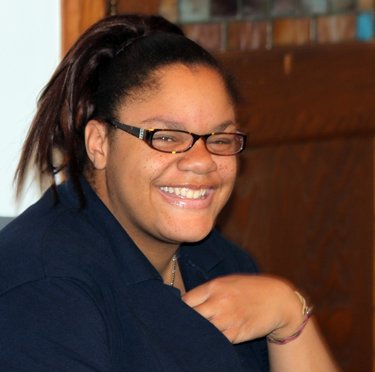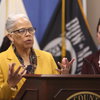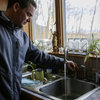Williams advises others to climb
— Photo from St. Anne Institute
Myiesha Williams, the eldest student in the Intensive Management Needs Unit at St. Anne Institute, had to build trust with her adoptive mother before visiting her home in Queens. Now, she visits regularly and has won an award from the Rotary Club of Albany for her work at the institute in Albany that helps the women who live there.
ALBANY — Before she was 18, Myiesha Williams’s bedroom in Jamaica, Queens, was refurnished with a new desk, closets, and a lamp for her return visit home. At St. Anne Institute, where she goes to school, home visits are a privilege.
At 14, she frequently walked away from her adoptive mother’s home with her phone turned off and classes still in session. Her friends walked her back, and she walked the other way. She was angry at her birth mother, she said, for being taken from her and not knowing why.
Williams was admitted to St. Anne three years ago and is soon going to graduate with a Career Development and Occupational Studies credential, earned partly through working at a local Hannaford grocery store.
The eldest student in her unit for the past three years, Williams encourages her peers to lift themselves up. She said she looks out for them, like a big sister.
“I try to cheer them up, to say, ‘You have to do certain steps to do home visits,’” said Williams, who goes home from St. Anne in Albany to her adoptive mother, Gwen Wellington, about three weekends each month.
“I am the senior of the building,” said Myiesha Williams. “And I’m the most responsible child in the building.”
She chooses who among the younger students to mentor and walks them to class after finding them in the halls of St. Anne. The young women there come from troubled backgrounds, and are sent to St. Anne by parents or courts wanting structured routines and therapy for the teenagers. Williams is part of the residential Intensive Management Needs Unit.
Two of the younger students call Williams “Teddy Bear,” and others have given her nicknames. The reason, she says, is because they come to her for help.
“I think they look to Myiesha as a role model because of her age, but also because of the length of time at St. Anne’s,” said Nicole Iwaniec, Williams’s case manager. “I think there’re difficulties that kids encounter with the rules and expectations, and relations with staff and other kids, and I think they see Myiesha as somebody who has done well in this environment and the program, and the rules and expectations that come with it.”
The role modeling that Williams said she took on at St. Anne is just what Brian Barr saw a need for when he created the Youth Recognition Award 30 years ago. Williams was recognized with the award at a Rotary Club of Albany luncheon at Taste restaurant yesterday.
“Many of the youngsters haven’t had a positive experience with community organizations or institutions, like a Rotary Club, like a Kiwanis club, like any of the organizations that you and I have had the good fortune to be associated with,” said Barr, a former director of clinical and community services at the La Salle School, one of six residential child-care agencies that nominate students for the award every year.
Iwaniec said St. Anne selects nominees based on how they have improved over their time at the agency.
When Williams arrived, she said, she cried and wanted to be with her adoptive mother, Gwen Wellington.
Williams wouldn’t tell Wellington when she would leave home. When she did return, her siblings helped her through a window in their bathroom, where she slept on the floor to avoid confronting her mother. She had angry fits, she said. Her mother would wake up and Williams would be gone, or downstairs with a boy.
Williams says she was frustrated over being taken from her biological mother, Valerie Williams, and not knowing why.
“The amount of drugs she did went through all the kids she had,” Williams said of her birth mother. “Mine affected me in a different, other way. I don’t fight, I just act out very inappropriately.”
Because of Williams’s behavior, Iwaniec said, her adoptive mother was at first concerned about her coming home to visit from St. Anne. They had to build trust. Over the course of a year, Gwen Wellington visited St. Anne.
When she was in school, in Queens, Williams was bullied. She wouldn’t fight; instead, she’d skip school. At St. Anne, she said, girls criticized the way she looked. “As I got older and I spent my 16th birthday here, I kind of got sick of people bothering me and I used to talk, and I have a smart mouth,” said Williams.
This Mother’s Day, Williams made Wellington a beaded bracelet, spelling her name. Wellington gave birth to two children and she adopted Williams and three of her biological siblings, as well as another son. Williams refers to her as her “Mom.”
Williams is looking forward to leaving St. Anne, so she can apply for jobs when she returns to Queens and no longer depend on her mother for income. Williams has taken jobs at the institute — in a church thrift shop, delivering mail at the institute, washing cars for staff, and in the kitchen.
During her three years at St. Anne, Williams said, she’s come to recognize her past decisions could have led to danger.
“I’m the kind of person where I have no fear,” Williams said. “And I’m like that to this day. I have no fear of anything.”
One man's mission
The broad criteria for nominees for the Youth Recognition Award is the manifestation of courage and perseverance. In addition to being recognized at the luncheon, the recipients receive gifts from local businesses and paper certificates.
The paper, though, is symbolic, Barr said; the focus is on the teenagers.
“It’s all about affirming these young people,” said Barr. “They’re can-do people. They’re achievers and that’s what the whole ambiance of the program is about.”
He added, “It’s hard when you’ve got a foot on your neck, and that’s the perception people have of you.”
The founder of the program, Barr has attended every luncheon for the past 30 years. He serves on the youth committee for the Rotary Club of Albany, which was competing with other organizations to honor the best local scholars and athletes when he pitched his idea.
“We just knew that there was a very under-recognized population in the city of Albany that was going under appreciated for the challenges that they endure on a day-by-day basis, and that it would be worthwhile for an organization like Rotary to step up and go out of their way and recognize this foster-care population who have been removed from their community schools, from their homes, from their neighborhoods, and are being asked to form new relationships and to succeed in situations that are most difficult,” said Barr.
The Rotary Club honors children from St. Catherine’s Center for Children, Parsons Family and Child Center, the La Salle School, St. Anne Institute, Community Maternity Services, and Equinox every year.
Representatives from each agency tell the stories of the award recipients, explaining why they were chosen for the award. Many of the children have had emotional problems or trouble with authority figures.
Barr said the causes of children being admitted to the six agencies depend on the individual. For some, the lack of support in their environments is clear, he said, but, in others, the children may have learning deficits that make them feel inferior, regardless of praise.
The luncheon gives those people a shot in the arm, he said.
“It may be the first time a parent has heard anything in public said about their kid that is positive and affirming,” said Barr.
The social workers who work regularly with the children come, too.
“It’s not an easy job,” said Barr. “But, when they see these kids and they hear some of the turnaround stories, it just gives them heart and gives them an added push that it’s worthwhile after all.”
The luncheon is meant to acknowledge the children in a big way, but it’s also to expose them to the prestigious people who attend or speak at the event. Rotarians they meet might share business cards or offer advice.
When family court Judge Martha Walsh Hood was a guest speaker at the luncheon two years ago, Barr remembers, one of the students told those gathered what the day meant to her.
“She said, ‘I’m going to be a lawyer, I’m going to be an attorney,’” Barr recounted. “She said, ‘I’m going to do what Judge Walsh does, I’m going to help young people in trouble, because that’s important to me, too.”



